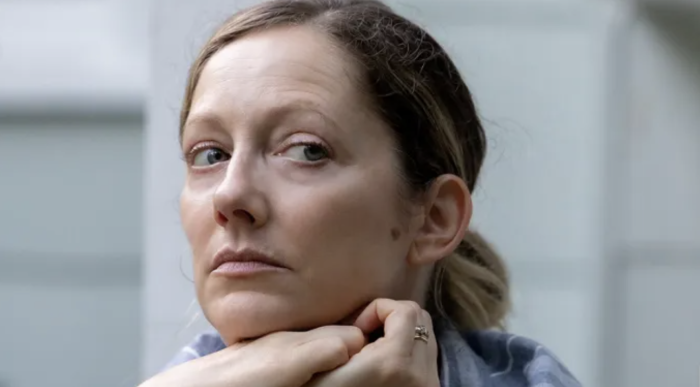
In “Eric LaRue,” Michael Shannon’s stark and meditative directorial debut, there are no gunshots, flashbacks or screaming headlines.
And yet, the film might be one of the most quietly devastating portrayals of a school shooting ever brought to screen — precisely because it doesn’t look at the violence, but at those left behind in its wake and the subsequent theological questions that arise.
From Magnolia Pictures, the film centers not on the victims or even the perpetrator, but on Janice LaRue (Judy Greer), the mother of the boy who killed three classmates before being sentenced to life in prison.
Adapted by Brett Neveu from his own 2002 play, “Eric LaRue” grapples with the lingering, complicated questions of guilt, forgiveness, faith and redemption — not in a courtroom or a cable news studio, but in kitchens, churches and painful silences.
In an interview with The Christian Post, Shannon, who has appeared in Blockbuster films like “Pearl Harbor” and “Man of Steel,” said the emotional weight of the story inspired him to bring it to the big screen.
“I remember this play in 2002, seeing it in Chicago,” he said. “And then, when [Brett] gave me the screenplay, I just was so moved by the community. All of the characters moved me in different ways. … When you act, you pick a character … but I wanted to direct so I would have a hand in all of the characters and all the relationships. Building that community was the idea.”
That fractured community includes Janice’s husband, Ron (Alexander Skarsgård), who flees into the comfort of Redeemer Church, an Evangelical congregation led by Bill Verne (Tracy Letts), where an eager parishioner (Alison Pill) feeds his growing zeal. Janice, by contrast, remains quietly anchored to a more restrained First Presbyterian church, led by Pastor Steve Calhan (Paul Sparks), where a circle of grieving mothers attempts a cautious reconciliation.
The spiritual tension between these two churches is visceral; while one church focuses on positivity and prosperity theology, the other over-emphasizes penance. Neveu told CP he visited a number of denominations while writing the story to capture their differences.
“I think just that there’s a contrast there,” Neveu explained. “I feel like everybody’s right about the path that they’re on. Certainly our two pastors are right about the things they say. There’s good advice, there’s bad advice. But I remember: we’re all human.”
Neveu, who grew up attending churches of various Christian denominations, said he intentionally left the script’s spiritual underpinnings unresolved. “It was confusing, but also enlightening. I tried to let that inform the script. My hometown is just chock full of churches … and everybody seemed to believe different things — similar things, but very different things too.”
Greer, who last appeared in the faith-based film “The Best Christmas Pageant Ever,” pointed out that throughout “Eric LaRue,” the craving for resolution is never fed. There are no answers to be found — only aching questions and an invitation to wrestle.
“We’re not used to doing that in life,” Greer said. “We’re now programmed to take care of our needs as soon as we have them. To teach ourselves how to sit in unease, I think, is a real skill. And I had a hard time with it while shooting the movie.”
“The lines, the scenes, they sort of spoke for themselves. … I think Janice feels like she committed the crime. And in some ways, the crime is committed against her.”
According to Neveu, that emotional ambiguity is precisely what he wanted to preserve. “My goal as a writer is always to try to understand. It’s like therapy — you go in knowing there’s something that you’re thinking about, but it never really goes away. You just get to talk about it.”
Greer, who was raised Catholic, was also struck by the absence of onscreen violence: “I haven’t seen something that takes place without any violence in it — which I don’t think is necessary to tell a story like this. I can’t imagine, and I think I got as close as I can to understanding what it would be like.”
Greer said playing Janice profoundly changed her perspective on motherhood. Throughout the film, Janice has flashbacks of her son as a playful little boy as she grapples with her bleak reality.
“We’re supposed to know everything, do everything, have all the answers,” Greer reflected. “And then at the end of the day, when we do everything perfectly, we’re still blamed for all the crap our kids do. This is obviously an extreme situation, but … we are really lucky to be moms, but I think we could use more than one day a year to celebrate.”
She added that Janice is a portrait of grief not often explored: a mother not of a victim, but of the one who caused the pain. The faith community around her, strained by its own fault lines, becomes both a haven and a proving ground for spiritual reckoning.
“What I was really interested in,” Neveu said, “was where these pastors begin with their advice — and where they end up, just as human beings. Once the police leave, once the reporters leave, the community’s still there with it.”
With its heavy themes and sometimes negative portrayal of religion, “Eric LaRue” is not a faith-based film (it’s also not rated, but has a substantial amount of coarse language). But that idea — that churches are often the last ones standing when the world moves on — underscores its most spiritual questions: Can religion offer real healing?
“Even with all these resources, you know — the Church [and others] at our disposal — it seems like something’s broken in the fundamental equation of our society,” Shannon said. “There’s some sort of dysfunction that it would behoove us to get a handle on.”
In one unforgettable scene, Janice sits across from the mothers of the boys her son killed. No truce is declared, and no forgiveness is given, but the silence in the room is sacred.
“I think all these people deserve a voice,” Greer said. “We’re not supposed to complain. We’re not supposed to make mistakes. We’re not supposed to have one bad thought. But grief doesn’t work like that.”
“Eric LaRue” is now available on digital streaming.
Leah M. Klett is a reporter for The Christian Post. She can be reached at: leah.klett@christianpost.com


















